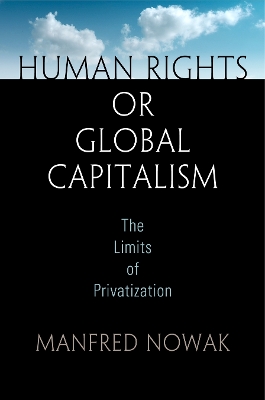Pennsylvania Studies in Human Rights
2 total works
The fall of communism in the late 1980s and the end of the Cold War seemed to signal a new international social order built on pluralist democracy, the rule of law, and universal human rights. But the window of opportunity for creating this more just, more equal, and more secure world slammed shut just as quickly as it opened. Rather than celebrate the triumph of democracy over autocracy, or political freedom over totalitarian rule, the West exulted in the victory of capitalism over communism. Neoliberal policies of deregulation and privatization that minimized the role of the state were imposed on the transitional societies of Central and Eastern Europe, as well as economically weak and politically fragile nations in Africa, Asia, and Latin America. Twenty-five years later, the world reaps the fruits of that market-driven state foundation: inequality; poverty; global economic, food, financial, social, and ecological crises; transnational organized crime and terrorism; proliferating weapons; fragile states.
Human Rights or Global Capitalism is not simply concerned with the success or failure of neoliberal policies per se or judging whether they are good or bad. Rather, it examines the application of those policies from a human rights perspective and asks whether states, by outsourcing to the private sector many services with a direct impact on human rights-education, health, social security, water, personal liberty, personal security, equality-abdicate their responsibilities to uphold human rights and thereby violate international human rights law. Manfred Nowak explores these examples and outlines the ways in which neoliberal policies contravene the obligations of states to protect the human rights of their people.
Torture represents a direct attack on the essence of human dignity. Its mere mention evokes a prolific and sordid history: Europe in the Middle Ages, with beds of nails, witch hunts, and burnings; the brutal methods used by military dictatorships against political dissidents in 1970s Latin America; and the gruesome photographs from Abu Ghraib, Guantanamo Bay, and other Bush-era places of detention. While leaders in the West had once hoped that torture would disappear by the end of the twentieth century—and that our children would read about this unfathomable practice in history books and not in the daily papers—research indicates that torture is still routinely used in the majority of twenty-first-century nations.
In his six years as the United Nations Special Rapporteur on Torture, Manfred Nowak was tasked with reviewing thousands of complaints of torture and detention, investigating facts and circumstances surrounding the global practice of torture, and drawing up recommendations aimed at combating torture. Now, in Torture, readers can get a firsthand glimpse of how modern-day torture is investigated and understood by those working on the frontlines of researching, addressing, and preventing it.
Nowak recounts his experience visiting countries, reviewing documents, collecting evidence, and conducting interviews with perpetrators, witnesses, and victims of torture. He offers vignettes of the many states he visited, comparing their diverse experiences, and he explores the rise of new twenty-first-century practices of torture, questioning whether capital punishment, corporal punishment, solitary confinement, and contemporary forms of slavery qualify as torture. Ultimately, Torture offers vital insights for human-rights scholars and professionals as it tries to make the unfathomable more comprehensible and to clarify the causes and dynamics of torture.

